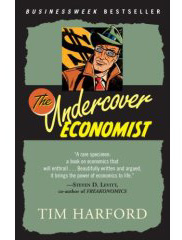Lately, I’m finding economics endlessly fascinating. No, really.
Maybe it’s because I never took a course on it in college, and so never had to memorize index funds and complicated formulas, but “The Financial Page” is quickly becoming one of my favorite sections in the New Yorker magazine. (Here’s a puzzle for them: why do they publish every week when they know that everyone has at least two unread New Yorkers sitting in a pile somewhere at any given time?)
On Slate, I head straight for Tim Harford’s pieces on finding economics in action outside of Wall Street, in which he calls himself “The Undercover Economist.” So I was excited to find that he’s recently written a book with the same title, made just for mathematically-disinterested econ amateurs like me!
I just finished reading it, and I must recommend it to pretty much anyone, except maybe for econ people who already know what they’re talking about when they discuss free trade or why coffee at Starbucks costs so much while coffee growers are paid so little. Harford even almost makes a convincing case of letting economists run the world—maybe this wouldn’t be such a bad idea if people were inherently rational beings.
In any case, Harford is great at explaining the economics behind everyday human interactions, as well as basic questions about the world: why are some poor countries getting much richer than others, why is traffic so terrible in some cities, and why do I buy the most expensive drink on the menu at Starbucks? (He spends a lot of time on Starbucks, and I spend a lot of time in Starbucks.)
So kudos to Tim Harford. Thanks to him, pop economics is quickly becoming the new pop science!


+1 — I got a lot out of it too.
Hmmmm, where do I find a latte around here?
the title looks really interesting, but I am horrible at complicated forumulas. This book is more like a narrative right? Not…a math book for understanding the world?
I love economics as a way to easily understand answers to questions some people ask themselves their whole lives (why are some people rich and some poor, why are people selfish, why does a guy in India answer my tech support call, etc.) If you start with the assumption that people tend to act rationally and work from there, you can find out all sorts of things!
What gets really fascinating is when people stop acting rationally. In fact, I think most modern economics research deals with how or why the real world break the “rules” of economics – why someone would invest in a fund that uses money in a socially concious way even though it pays less, how people keep track of an informal economy without written rules, why people name their kids something when just having that name means the kids will make less money, and on and on.
No math, Mikki, but some easy logic.
Ribbles, you’re so right, of course. At my level of economic understanding, though, the basic concepts are pretty mindblowing in themselves.